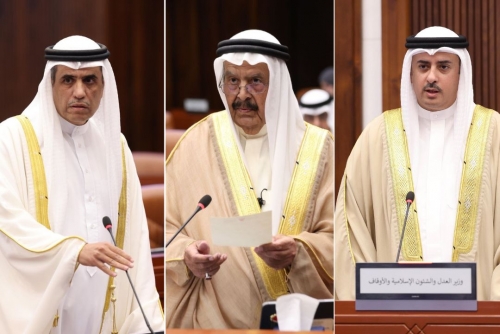Shura Council backs expansion of alternative sentencing on way to rehabilitation
TDT | Manama
Email: mail@newsofbahrain.com
Over 8,000 convicts have been spared jail time under Bahrain’s alternative sentencing law.
Now the Shura Council has agreed to extend its scope, approving changes to the legislation during its session yesterday and passing the bill to the Prime Minister.
The draft, tied to Royal Decree No. 96 of 2024, amends Law No. 18 of 2017.
It proposes new forms of non-custodial punishment, sets out a single body to manage enforcement, and grants the Interior Minister power to decide where such sentences may be carried out.
Justice, Islamic Affairs and Waqf Minister, His Excellency Nawaf bin Mohammed Al Maawda, and Social Development Minister, H.E. Osama bin Saleh Al Alawi, attended the debate.
Final vote
A final vote was taken in the same sitting, with the bill now on track to reach His Majesty King Hamad bin Isa Al Khalifa.
Ali Al Aradi, rapporteur for the committee handling the matter, said the changes aimed to keep up with shifts in working life and to improve how sentences are put into practice.
“This will help those affected to find their footing again,” he said.
Al Maawda told the chamber that each case is weighed up carefully.
Behaviour
“Every file comes with a report, and each person is assessed by those in charge of security, as well as staff inside the correctional facility. Their behaviour inside the prison is taken into account,” he said.
“There are ways of checking if someone has gained anything from their time on an alternative sentence. No one walks out the door unless they’ve ticked all the boxes and proved ready.”
During the discussion, Shaikh Ahmed Al Khalifa questioned the match between the new types of sentence and the nature of the offences.
“Is the replacement really fair in light of the crime?” he asked. He also wanted to know if those under review are given proper assessments, not just in terms of behaviour, but their state of mind and health.
Support
He noted that many departments had supported the proposed changes.
“This offers a way back. It gives those sentenced to jail a chance to be part of society again.”
Dr Ali Al Rumaihi, who chairs the Foreign Affairs, Defence and National Security Committee, said 8,278 people had already benefitted from the existing law since it came into force in 2018.
“The idea has been put to work here more than in most places across the region,” he said. “These changes will make it clearer who is in charge of what, and will widen the use of these sentences.”
Input
Dr Jehad Al Fadhel, Second Deputy Chairwoman of the Council, said the law had evolved with input from the Ministry of Interior, based on how it has played out on the ground.
“The thinking has changed. Prisons here are not just holding pens. The purpose is to put people back on their feet.”
She added that some of the planned penalties involve treatment in mental health clinics.
Villain
“That shows a grasp of the fact that not everyone behind bars is a villain. Some need help, not a cell.”
Dr Al Fadhel suggested that a fund be set up to support those sentenced under the new scheme.
Related Posts

